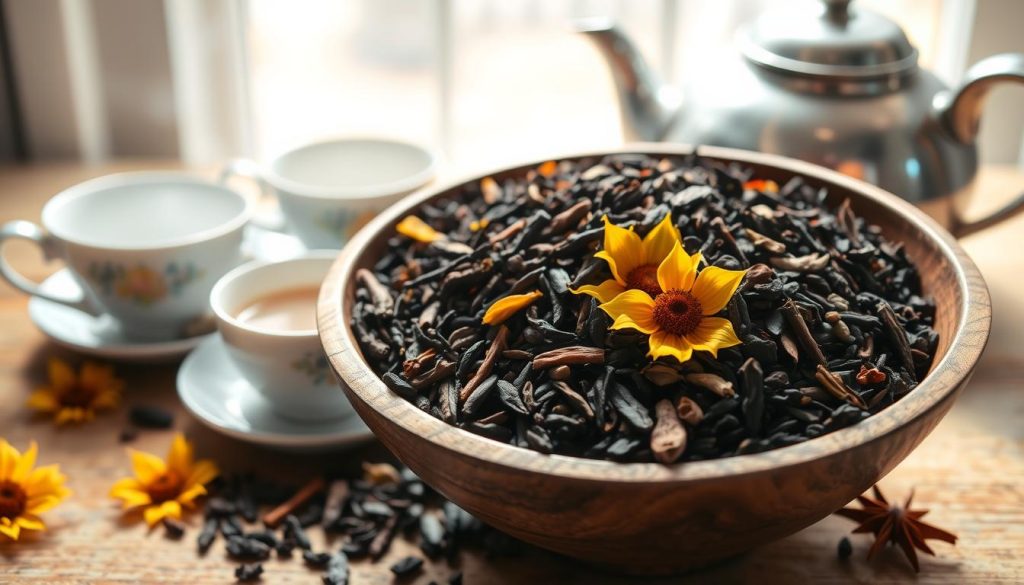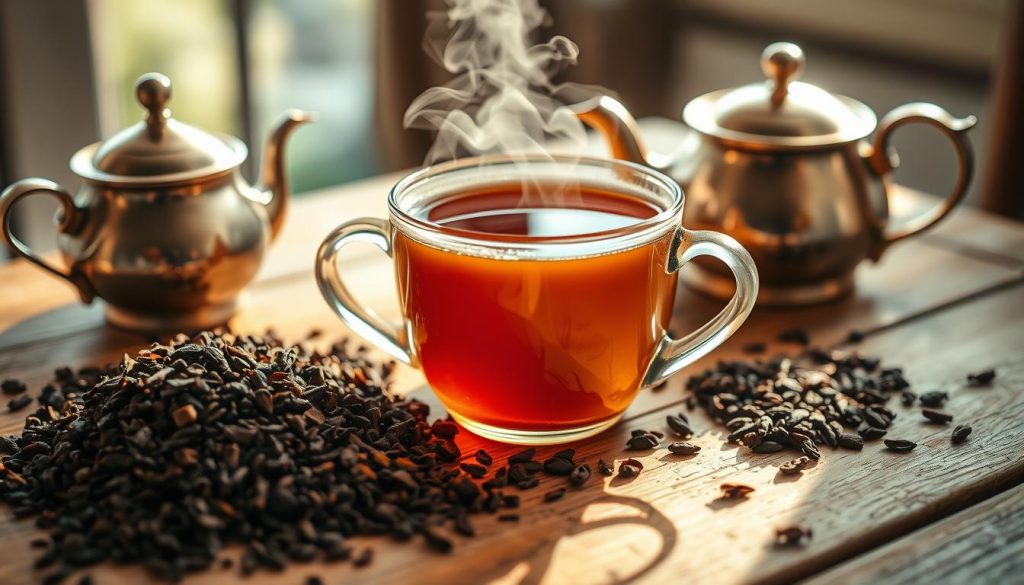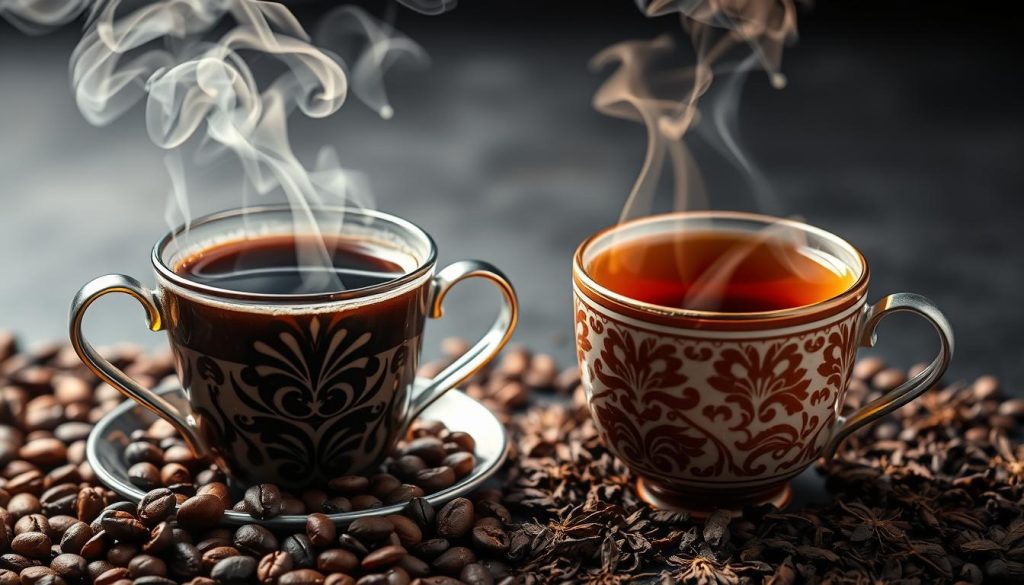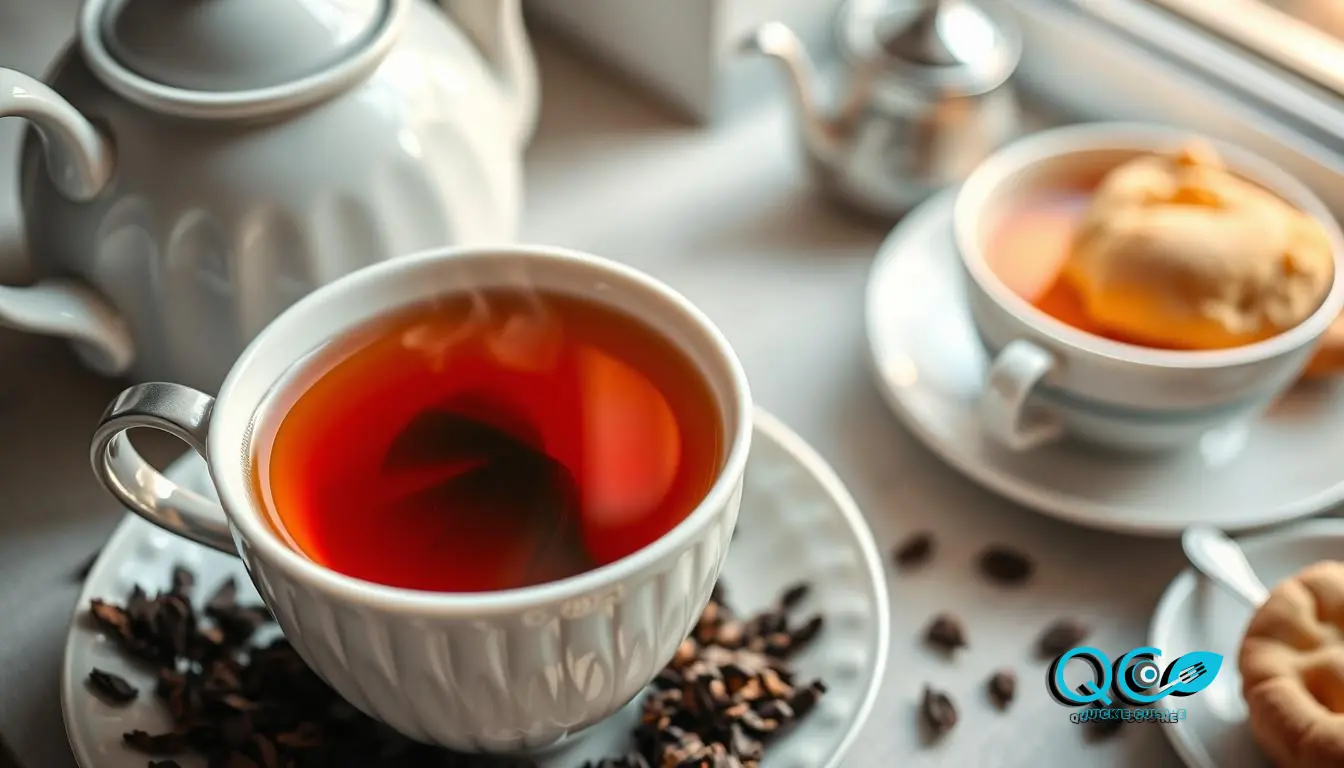An 8-ounce cup of English breakfast tea usually has 40-70 milligrams of caffeine. This amount might surprise many tea lovers. The tea is known for its strong flavor. In this guide, we’ll look at the caffeine in English breakfast tea, its health benefits, and how it compares to other drinks.
I love tea and enjoy learning about its varieties. English breakfast tea has a long history and many fans. Its mix of black teas is comforting and energizing. This article will help you understand what makes this tea special. It will also guide you in choosing the right amount of caffeine for your day.
Understanding English Breakfast Tea Composition

English breakfast tea has a long history, starting in the early 19th century. It’s known for its strong, full-bodied taste. This makes it a favorite for starting the day.
The mix of english breakfast tea blend can change with each brand. But, it usually combines top-quality black teas from different places.
Origins and Traditional Blend Components
The classic english breakfast tea blend includes teas from Assam, Ceylon, and Kenya. Each place adds its own special taste to the mix. Assam teas from India are rich and malty.
Ceylon teas from Sri Lanka are bright and lively. African teas, like those from Kenya, bring a bold, earthy flavor.
Types of Tea Leaves Used
The tea leaves in english breakfast are picked with care to make a balanced mix. High-quality whole-leaf black teas are used for a rich taste. Some brands might add a bit of Chinese black tea for a softer, smokier note.
Regional Tea Characteristics
The unique black tea composition of English breakfast tea comes from blending teas from various places. Chinese teas add a delicate, smoky taste. Indian and African teas bring bold, malty, and earthy flavors.
This mix of tastes creates the strong, balanced flavor that English breakfast tea is known for.
Does English Breakfast Tea Have Caffeine

Yes, English breakfast tea does have caffeine. It’s a black tea blend known for its strong flavor. An 8-ounce cup has about 47 milligrams of caffeine.
English breakfast tea has more caffeine than green tea but less than coffee. A drip coffee has 96 milligrams of caffeine per 8-ounce cup. Espresso has 64 milligrams in one ounce, and a double espresso drink has 128 milligrams.
| Beverage | Caffeine (per 8 oz) |
|---|---|
| Drip Coffee | 96 mg |
| Espresso (1 oz) | 64 mg |
| English Breakfast Tea | 47 mg |
| Green Tea | 28 mg |
| Chai Tea | 40-60 mg |
| Pu-erh Tea | 100 mg |
The caffeine in English breakfast tea can change based on the tea blend and brewing method. Steeping the tea for 5 minutes can extract 35-70 milligrams of caffeine. Steeping for just 1 minute extracts 14-20 milligrams.
English breakfast tea has a lot of caffeine, but it’s not as much as coffee. It’s a good choice for a morning boost without the jitters.
Caffeine Content Comparison with Coffee

English breakfast tea and coffee have different amounts of caffeine. An 8-ounce cup of drip coffee has about 96 mg of caffeine. On the other hand, an 8-ounce serving of English breakfast tea has around 47 mg on average. This shows that coffee generally has more caffeine than tea.
Espresso-Based Drinks Comparison
Espresso-based drinks also have a lot of caffeine. A single shot of espresso (1 oz) has about 64 mg of caffeine. A typical 12-ounce espresso drink, with two shots, has around 128 mg of caffeine.
Daily Caffeine Intake Considerations
The FDA suggests that healthy adults should not have more than 400 mg of caffeine a day. This is important to remember when you drink your morning tea or coffee. Knowing how much caffeine you’re getting from different drinks helps you stay healthy.
In summary, English breakfast tea has less caffeine than coffee but still gives a good energy boost. Knowing the caffeine levels in different drinks helps you choose what’s best for your daily caffeine needs.
Factors Affecting Caffeine Levels in English Breakfast Tea
The amount of caffeine in English Breakfast tea can change based on several things. Knowing these can help you control how much caffeine you get. This way, you can enjoy this tea more.
The brewing time is a big factor. Steeping for 5 minutes or more can pull out more caffeine. This can be between 49 to 70 milligrams per 8-ounce cup. But, steeping for just 1-2 minutes will give you less, around 14 to 29 milligrams.
The water temperature also matters. Using hotter water can get more caffeine out of the tea leaves. This means you’ll get more caffeine than if you used cooler water.
The type and quality of tea leaves used also affects caffeine levels. Teas with more Assam black tea, which has more caffeine, will have more caffeine. This is different from teas with a balanced mix.
| Tea Variety | Caffeine Content (per 8 oz) |
|---|---|
| English Breakfast Tea | 40-70 mg |
| Assam Black Tea | 60-90 mg |
| Darjeeling Black Tea | 40-70 mg |
| Ceylon Black Tea | 50-90 mg |
| Green Tea | 25-29 mg |
| Herbal Tea | 0 mg |
The serving size of English Breakfast tea also affects caffeine intake. A standard 8-ounce cup has 30 to 60 milligrams of caffeine. But, bigger cups mean more caffeine.
By knowing these tea caffeine factors, you can choose how much English Breakfast tea you drink. This helps you manage your caffeine intake based on your preferences and needs.
Brewing Methods and Caffeine Extraction
The way you brew your English Breakfast tea affects the caffeine it holds. Knowing the best brewing methods is crucial for a perfect cup with the right caffeine.
Optimal Water Temperature
For the best results, aim to brew your English Breakfast tea with water that’s around 200°F (93°C). This temperature range is perfect for extracting the tea’s caffeine and other good stuff without burning the leaves.
Steeping Time Effects
The longer you steep your English Breakfast tea, the more caffeine it will hold. Steeping for 1-2 minutes gives you about 20-40 mg of caffeine. But steeping for 5-6 minutes can give you 60-70 mg.
Leaf-to-Water Ratio Impact
The ratio of tea leaves to water also affects caffeine content. Using more tea leaves means more caffeine in your cup. Try different ratios to find your favorite.
Mastering brewing variables like water temperature, steeping time, and leaf-to-water ratio unlocks your tea’s full flavor and caffeine. Adjust these to match your taste and caffeine needs.
Health Benefits of English Breakfast Tea
English breakfast tea is more than just a caffeine boost. It’s packed with antioxidants that fight off free radicals. Drinking it regularly can make you feel more alert, improve your heart health, and help with digestion.
The UK Tea and Infusions Association is studying black tea’s health effects. They’re looking into how it affects blood pressure, weight, bone health, and some cancers. They believe the best black tea leaves, found in top English breakfast blends, are key to staying healthy.
One cup of English breakfast tea has 35 to 50 milligrams of caffeine, less than coffee. This slow release keeps you alert and focused without the jitters. Enjoying a cup can also help reduce stress and promote relaxation, boosting your overall well-being.
- Black tea health benefits
- Antioxidants in tea
- Tea and wellness
Comparing Caffeine Levels with Other Tea Types
English breakfast tea has a good amount of caffeine compared to other teas. It has 40-70 milligrams of caffeine in an 8-ounce serving. Other teas can have more or less caffeine.
Green Tea Comparison
Green tea is known for its health benefits and has less caffeine. An 8-ounce cup of green tea has about 25-29 milligrams of caffeine. If you want less caffeine, green tea is a good choice.
Chai Tea Analysis
Chai tea has a similar amount of caffeine to English breakfast tea. An 8-ounce cup of chai tea has around 40-60 milligrams of caffeine.
Other Black Tea Varieties
Black tea varieties have different caffeine levels. Assam black tea has 60-90 milligrams of caffeine per 8-ounce cup. Darjeeling black tea has 40-70 milligrams, and Ceylon black tea has 50-90 milligrams. These amounts are similar to English breakfast tea.
| Tea Type | Caffeine Content (per 8 oz cup) |
|---|---|
| English Breakfast Tea | 40-70 mg |
| Green Tea | 25-29 mg |
| Chai Tea | 40-60 mg |
| Assam Black Tea | 60-90 mg |
| Darjeeling Black Tea | 40-70 mg |
| Ceylon Black Tea | 50-90 mg |
Best Times to Drink English Breakfast Tea
English breakfast tea is a favorite for morning, with its strong taste and just the right amount of caffeine. It’s perfect for a hearty breakfast, giving you a boost to start the day. But it’s not just for mornings; you can enjoy it all day long.
In the morning, English breakfast tea is a great choice. It has about 47 mg of caffeine per 8-ounce cup. This helps with focus and memory, making it a great way to begin your day. It’s milder than coffee, offering a steady energy boost.
Later in the day, it’s a great pick-me-up. The caffeine gives you energy without the jitters or crash that can come with strong drinks. Drinking black tea, like English breakfast, in the afternoon can also help with digestion.
But watch the timing. Drinking it too late can mess with your sleep. Caffeine in black tea takes a few hours to wear off. So, it’s best to have it before late afternoon.
For a bedtime wellness boost, try a cup of English breakfast tea around 8:30 pm. It has antioxidants and a bit of caffeine, which can help your immune system and overall health before sleep.
When you drink English breakfast tea, choose a high-quality brand. Golden Tips, a well-known tea maker since 1933, offers a top-notch English breakfast tea. It’s sure to please your taste buds at any time.
| Beverage | Caffeine Content (8 oz) |
|---|---|
| Drip Coffee | 96 mg |
| English Breakfast Tea | 47 mg |
| Espresso (1 oz) | 64 mg |
| Latte or Cappuccino (12 oz) | 128 mg |
Choosing Quality English Breakfast Tea Brands
When picking the best English breakfast tea brands, look for quality. Twinings is a good choice with 40-50 mg of caffeine per 8-ounce cup. For a stronger taste, PG Tips and Yorkshire Tea have 60-70 mg of caffeine.
Exploring quality tea selection? Tazo and Bigelow offer English breakfast teas, including decaf. They share details about their blends and caffeine, helping you choose what you like.
| Tea Brand | Caffeine Content (per 8 oz cup) | Blend Characteristics |
|---|---|---|
| Twinings | 40-50 mg | Moderate caffeine, balanced flavor |
| PG Tips | 60-70 mg | Robust, full-bodied taste |
| Yorkshire Tea | 60-70 mg | Strong, intense flavor profile |
| Tazo | Varies (including decaf options) | Diverse range of English breakfast tea blends |
| Bigelow | Varies (including decaf options) | Varied English breakfast tea choices, including flavored varieties |
By looking at these tea brand comparisons, you can find the best English breakfast tea for you. It will match your taste and caffeine needs, making your tea time enjoyable.
Conclusion
English breakfast tea gives a moderate caffeine kick and lots of health perks. It has 40 to 70 milligrams of caffeine per cup. This is less than coffee but more than some teas.
The way you brew it and the tea’s quality can change how much caffeine you get. This lets you enjoy the tea’s rich taste and tradition while controlling your caffeine intake.
Knowing about english breakfast tea and its caffeine in tea recap helps tea lovers make smart choices. Whether you want a bit of energy or health benefits, this tea is a great choice. It’s versatile and can be enjoyed in many ways, fitting your tea drinking tips.
Starting your tea adventure? Enjoy the history, smell, and health benefits of english breakfast tea. Appreciate its caffeine in tea recap and how to brew it. This way, you can fully enjoy this classic morning drink.

